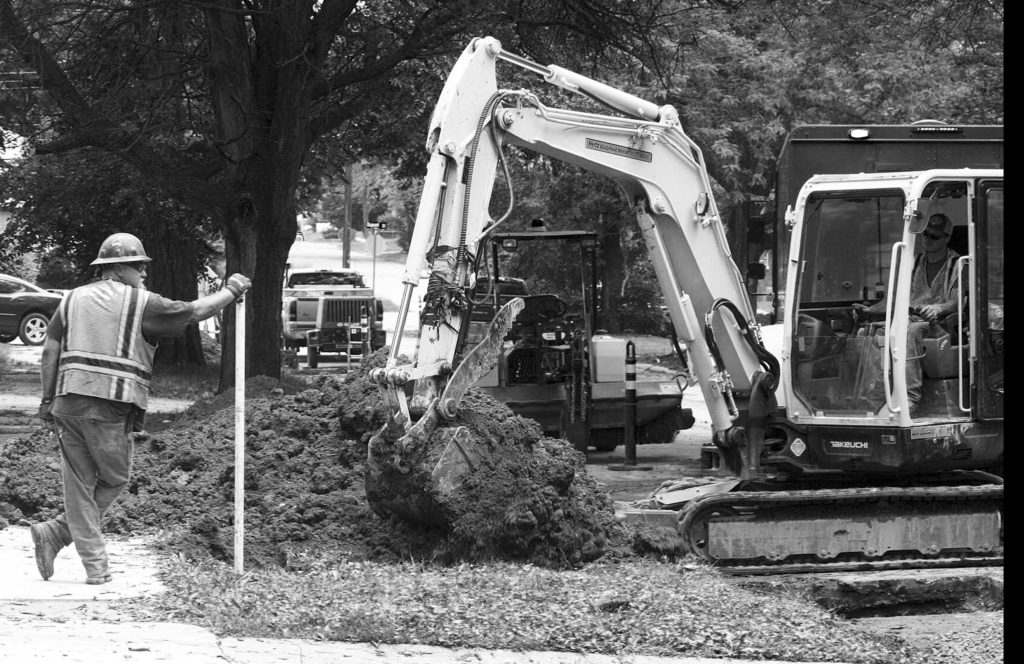By Jan Worth-Nelson
The City of Flint announced Tuesday that water pipeline replacement, paused the last two months by the coronavirus lockdowns, will resume this week.
When work stopped in March, 9,554 lead or galvanized pipes had been replaced, part of the city’s infrastructure recovery from the water crisis triggered in 2014 when the lack of corrosion control in the pipes from Flint River water unleashed lead from old pipes into the bodies of Flint residents. What happened to the city, under state takeover at the time, was labeled a national disgrace in what some called the worst human-made environmental disaster of our lifetimes.
A total of 25,409 pipes have been excavated in the water pipeline work, with 15,526 discovered to be copper lines not needing replacement.
The work, funded by $100 million from the federal Water Infrastructure Improvement for the Nation (WIIN) fund, originally was scheduled to be completed by 2019, but “fell behind schedule during the previous administration,” of former Mayor Karen Weaver, and because of the COVID-shutdowns, according to the city’s press release. Weaver was defeated in 2019 by Sheldon Neeley.
Workers will observe COVID-19 precautions throughout, city officials stated, as follows:
“Workers will remain a minimum of six feet from all residents. They also will wear gloves, face masks and face shields when going door-to-door. They also will ask residents how they are feeling and if it would be an appropriate time to do service line replacement work. All work areas inside the home will be thoroughly cleaned and sanitized.”
The city press release said the replacement program is about 85 percent complete, and is expected to be finished by the end of the year.
Mayor Neeley urged residents to cooperate with work crews doing the service line replacement project — answering the door, consenting to the work, and being home at the time of scheduled service.

Workmen replacing pipes on Copeman Boulevard, July 2017 (Photo by Edwin Custer)
Here is additional basic information for residents whose pipes still need to be replaced, from the city’s announcement:
“A resident 18 years or older must be home to consent to the service:
• Crews dig a hole to check the home’s pipes.
• If the pipes are copper, they are safe and do not need to be replaced. The hole is filled and crews stop asking for permission to check your service lines.
• If the pipes are lead or galvanized steel, the pipes will be immediately replaced in most circumstances. Crews will briefly need to enter the home to ensure the service line is connected properly. Workers will wear face masks and other protective equipment as well as follow additional safety precautions.
• Crews return to the residence to make additional yard and grounds repairs as needed. A resident does not need to be home for restoration work to occur.
 “Residents who previously declined to have service lines checked can still participate by calling 810-410-1133 (press 0 to leave a message). Shortly after taking office in November, the administration was notified that approximately 1,000 residents had previously been unresponsive to attempts to check home service lines.”Work crews will attempt to contact residents to schedule work at least three times — this is done by letter as well as visits to the household, at least one of which is done after 5 p.m. or on the weekend — but often check with residents far more than the three times required.
“Residents who previously declined to have service lines checked can still participate by calling 810-410-1133 (press 0 to leave a message). Shortly after taking office in November, the administration was notified that approximately 1,000 residents had previously been unresponsive to attempts to check home service lines.”Work crews will attempt to contact residents to schedule work at least three times — this is done by letter as well as visits to the household, at least one of which is done after 5 p.m. or on the weekend — but often check with residents far more than the three times required.
“Call 810-410-1133 (press 0 to leave a message) or email faststart@cityofflint.com for any service line replacement questions or concerns.”


You must be logged in to post a comment.